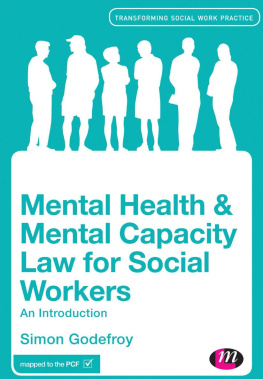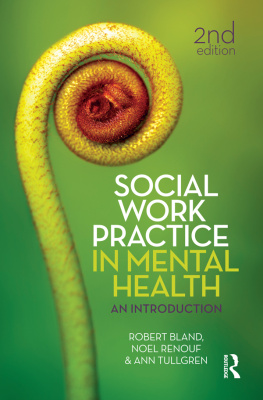The International Library of Sociology
SOCIAL SERVICE AND MENTAL HEALTH
Founded by KARL MANNHEIM
The International Library of Sociology
THE SOCIOLOGY OF MENTAL HEALTH
In 7 Volumes
I | The De-segregation of the Mentally Ill | Hoenig and Hamilton |
II | Lunacy, Law and Conscience, 1744-1845 | Jones |
III | Mental Health and Social Policy, 1845-1959 | Jones |
IV | Mental Hospitals at Work | Jones and Sidebotham |
V | Psychiatric Social Work in Great Britain (1939-1962) | Timms |
VI | Put Away | Morris |
VII | Social Service and Mental Health | Ashdown and Brown |
SOCIAL SERVICE AND MENTAL HEALTH
An Essay on Psychiatric Social Workers
by
MARGARET ASHDOWN
and
S. CLEMENT BROWN
First published in 1953 by
Routledge and Kegan Paul Ltd
Reprinted in 1996, 2000, 2001, 2002
by Routledge
2 Park Square, Milton Park,
Abingdon, Oxon, OX14 4RN
Routledge is an imprint of the Taylor & Francis Group
1953 Margaret Ashdown and S. Clement Brown
All rights reserved. No part of this book may be reprinted or reproduced or utilized in any form or by any electronic, mechanical, or other means, now known or hereafter invented, including photocopying and recording, or in any information storage or retrieval system, without permission in writing from the publishers.
The publishers have made every effort to contact authors/copyright holders of the works reprinted in The International Library of Sociology.
This has not been possible in every case, however, and we would welcome correspondence from those individuals/companies we have been unable to trace.
British Library Cataloguing in Publication Data
A CIP catalogue record for this book is available from the British Library
Social Service and Mental Health
ISBN 0-415-17808-8
The Sociology of Mental Health: 7 Volumes
ISBN 0-415-17835-5
The International Library of Sociology: 274 Volumes
ISBN 0-415-17838-X
Preface
T HIS book is about individuals who choose and are chosen for psychiatric social work, the use that they make of training and the shaping of their careers when they enter employment.
In so far as it is concerned with our direct experience the book refers exclusively to one course of training during a limited period of time. The fact that the special study round which it is written was confined to women cannot be without influence on the book as a whole. We regard men as important to the profession and consider that training of this kind has greater value when men and women are trained together. We could however only have done justice to the special circumstances affecting men if our study had been on a far larger scale. They were therefore regretfully omitted.
We hope that readers will not be confused by traces of the passing of time. This applies to the period at which individual subjects of the special study undertook their training and also to the survey of their subsequent employment. More than five years have passed since the book was planned. Within this period many changes have been taking place in the careers in which we have been interested, in the profession itself and in the mental health and other services. But the broader themes which have isolated themselves as the book progressed seem to us to be largely independent of this influence.
The advantages and disadvantages of the close personal concern which we ourselves had in the training we have described will be obvious, as will those attendant upon any form of collaboration in writing.
In connexion with the special study described in the book we wish to thank the London School of Economics and its Director for access to records, and all who, with such generous readiness, took part in the study as subjects or referees. We would also acknowledge the help of many professional colleagues, both in academic and practical work, with whom we have discussed what we were doing from time to time. Our debt to Eileen Young-husband is of a special kind, since we have not only had the great advantage of drawing upon her valuable reports undertaken for the Carnegie Trust1 but of receiving her personal advice and encouragement. We should like also to mention with special appreciation the encouragement both in our work and in our writing of Professor Aubrey Lewis and Professor T. H. Marshall. We are grateful for the general support of the Association of Psychiatric Social Workers in our endeavour, for the outcome of which they have of course no responsibility. We shall feel that some small return has been made if the book provides the Association with topics for lively controversy. All former students of the London Mental Health Course whom we have taught and through and with whom we have learned (whether or not they are members of the Association) have unwittingly put us in their debt. It is they indeed who are the true begetters of this book.
We are deeply indebted to N. Newbigin and to the anonymous contributor of another of the case studies in , who have added much to the value of this book.
We would express our thanks to all who have granted us permission to quote from published material. For our general ideas we have obviously drawn upon a much wider range of sources than our few references indicate.
1 Younghusband, Eileen L.: Report on the Employment and Training of Social Workers and Social Work in Britain (Supplementary Report), Carnegie United Kingdom Trust, 1947 and 1951.
Chapter I
Introduction
W ITHIN the present century the work people do, the suitability of different people for different types of work and the equipment needed to undertake them have all been subjected to a new kind of scrutiny. Work has been lifted out of its natural surroundings in the whole process of living and broken up into problems to be analysed. This has come about to a great extent for sternly practical reasons, not least those rooted in two world wars.1 But if, when the conception of work is examined, the communitys demand for the contribution of the individual takes first place, there is always present another considerationthe personal satisfaction which work affords to the individual, as an expression of his abilities and an assurance to himself of being needed by his fellows. This conception is certainly implicit in vocational guidance, which is concerned with serenity as a personal matter, as well as with the fact that if someone is, and feels himself to be, suited to the work he is doing, he is likely to make his best contribution to society. The converging of these two approaches is well illustrated by the investigation of the Industrial Health Research Board of the Medical Research Council reported in 1947 under the title of The Incidence of Neurosis Among Factory Workers.2
There are questions common to the whole range of work, from manual work, where the chief emphasis falls upon the breaking up of processes so that they may be carried out in the most economical way, to the professions, where emphasis might be said to fall almost evenly upon selection, training and practice. Valuable investigations have been undertaken in all three spheres, but, as far as we are aware, there exist few studies in which selection, training and practice are considered as an indivisible sequence,3 in terms of the person who chooses a particular form of work.










